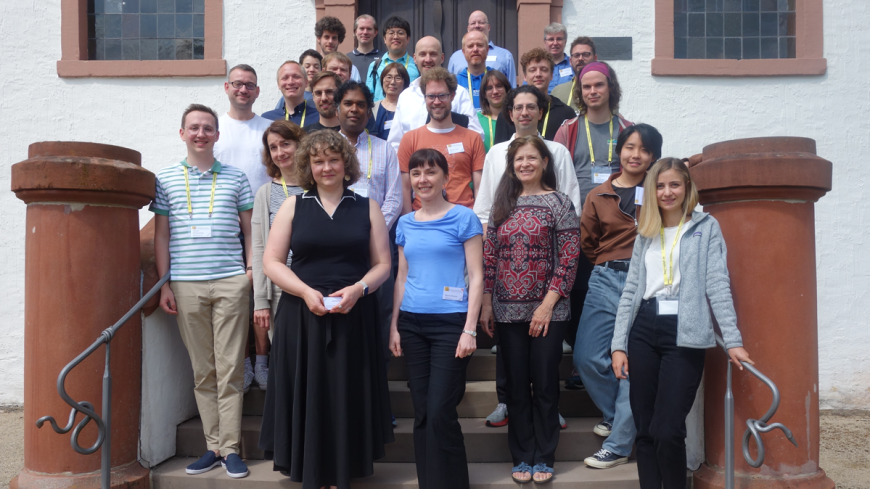Privacy Meets Practice
ENCRYPTO Researchers Contribute to Dagstuhl Seminar on Societal Applications of Privacy Tech
2025/08/05 by Daniela Fleckenstein
How can privacy-preserving technologies move from cryptographic theory into real-world use? That’s the question researchers tackled at the Dagstuhl Seminar “Building Privacy-Preserving Technologies of Societal Impact” (July 27 – August 1, 2025). Among them: members and alumni of TU Darmstadt’s ENCRYPTO group, who shared their experience with applying cryptographic protocols to societal domains such as civil rights and public-sector collaboration, to investigative journalism, and mobile contact discovery for messaging apps.

Privacy-preserving techniques like secure multi-party computation (MPC) and private set intersection (PSI) have come a long way in terms of performance and accessibility. Still, their adoption in practice, especially in areas with social relevance, remains limited. The Dagstuhl Seminar brought together researchers working on Privacy-Preserving Technologies (PETs) with demonstrated or emerging societal impact, along with practitioners from industry and non-profit organizations.
Among the participants were three members of the ENCRYPTO group at TU Darmstadt, whose talks were featured in the sessions on MPC/PET applications of societal impact:
- Andreas Brüggemann examined the German Self-Determination Act (SBGG), a 2024 law that allows transgender, intersex, and non-binary individuals to change their gender and name more easily. The law initially included a clause to automatically forward such changes to law enforcement agencies. Critics warned that this posed serious privacy and discrimination risks. Brüggemann discussed how PSI protocols could have enabled more privacy-preserving alternatives for such data flows, had they been considered during the legislative process.
- Dr. Kasra EdalatNejad focused on the needs of investigative journalists, presenting DatashareNetwork, a decentralized, privacy-preserving search engine co-developed with journalists and later deployed for the International Consortium of Investigative Journalists (ICIJ). The system allows journalists to find documents from peers containing sensitive information without exposing them or compromising source protection. This is a crucial feature, especially in repressive or hostile environments.
- Prof. Thomas Schneider offered a broader view on real-world PET applications from ENCRYPTO’s research. Use cases ranged from private contact discovery in messaging apps to lawful data sharing between investigative authorities, showing how MPC and PSI can give substantial privacy benefits over centralized systems and insecure hash-based matching approaches.
Deployment Experience from Alumni
In addition to the current group members, two ENCRYPTO alumni contributed valuable perspectives from PET deployments in industry and civil society:
• Dr. Ágnes Kiss (SINE Foundation) shared lessons learned from introducing MPC into German municipal services, highlighting how cryptographic privacy tools can support sustainability efforts, such as verifying product-level carbon footprints, without compromising competitive advantages when sharing data between multiple parties.
• Dr. Hossein Yalame (Bosch Research) presented CarbyneStack, a cloud-native MPC platform that is now part of the Linux Foundation Europe’s open-source ecosystem. His talk focused on architectural lessons and adoption hurdles in real-world cryptographic infrastructure.
Collaborating for Impact
While the technical focus of each talk varied, the experts shared a concern: How can privacy-preserving technologies become usable, trustworthy, and scalable, especially in sensitive, regulated, or high-stakes domains? The Dagstuhl seminar provided the rare opportunity to discuss these challenges bringing together diverse perspectives across institutions, disciplines, and generations.
“One important observation I made is that we need academics from all generations who have both the passion and the freedom to work on and push forward privacy-enhancing solutions of societal impact,” said Prof. Thomas Schneider after the seminar. “For ENCRYPTO, we are very happy to be given such conditions by the generous and flexible funding of DFG’s CRC CROSSING and the ERC Consolidator Grant PRIVTOOLS.”
Further Information
Dagstuhl Seminar 25312: Building Privacy-Preserving Technologies of Societal Impact.


